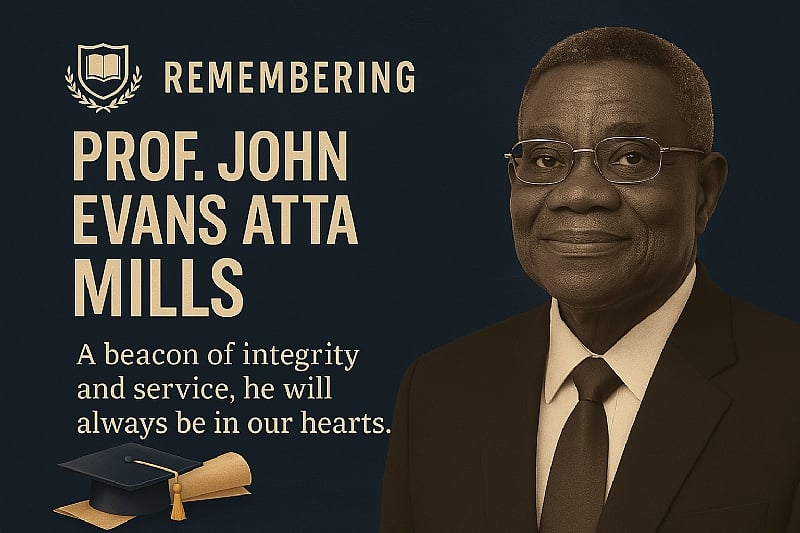🌴“Though dead, still useful and alive.” These solemn words, spoken during the 13th anniversary wreath-laying ceremony of Professor John Evans Atta Mills, hold more than remembrance—they evoke a living metaphor rooted deeply in Ghanaian cosmology. Just as the palm tree continues to serve even in death, so does Mills’ legacy nourish our civic conscience and national discourse.
🌾 The Palm Tree as Metaphor: Ghanaian Cosmology in Civic Memory
In Akan tradition, the palm tree is sacred and symbolic. Its towering trunk stands for strength. Its leaves shelter. Its fruit feeds. Its sap blesses rituals. And most profoundly, its seed—fallen yet fertile—is a metaphor for legacy. A palm seed does not rot in stillness; it sprouts in silence, when nourished by truth.
Professor Mills embodies that seed. Though he rests, his values bloom across classrooms, courts, campaigns, and communities. His utility wasn’t confined to governance—it echoed through pedagogy, principle, and public morality. Just like the palm tree, which offers oil, broom, wine, shade, and seed, Mills served in multifaceted ways—as scholar, reformer, peacemaker, and mentor.
📚 The Scholar Before the Statesman
Before occupying the highest office, Mills was a teacher of tax law. His lectures at the University of Ghana were not mere academic exercises—they were civic blueprints. As a Fulbright scholar, he merged global thought with local integrity, teaching leadership not just with theory, but with ethical clarity.
His academic journey spanned institutions in Ghana, the U.S., Canada, and the Netherlands. He authored seminal works on taxation and development, mentored a generation of ethical leaders, and introduced reforms as Commissioner of the Internal Revenue Service that enhanced transparency and fiscal accountability.
Those who sat in his classroom recall his calm demeanor, his refusal to ridicule, and his insistence on intellectual honesty. That was Mills’ silent preparation for a presidency rooted in peace—not populism.
🕊️ The Presidency: Principle Over Power
Between 2009 and 2012, Ghana witnessed a rare moment in governance. Mills did not command with noise—he governed with principle. His restraint in political rhetoric wasn’t weakness—it was wisdom. His administration valued reconciliation, fiscal responsibility, and quiet integrity.
Nicknamed the Asomdwehene, or King of Peace, his leadership style was not domineering—it was nourishing. Like the palm seed, his values were planted in soft soil, watered by humility, and shielded by courage.
Institutions like the John Evans Atta Mills Centre for Law and Governance continue to advance his vision for ethical leadership and responsive governance. As President Mahama reflected at the 13th anniversary ceremony:
“He placed truth over expediency, people over politics, and country over self.”
🌍 Civic Resonance: Legacy in Silence
The 13th anniversary ceremony at Asomdwee Park did not parade grief—it dignified it. What was absent in drama, was present in depth. Mourners did not compete to be seen; they showed up to feel. I was there—not as a spectator, but as a witness to the humility of true grief. No shaping. No claims beyond the bereaved. Just quiet, honest remembrance.
Yet within that stillness, a voice rose with force and clarity—Johnson Asiedu Nketia, with his flair for calculated rhythm, delivered what could only be described as a mathematical profusion of pointed truths. His vow to elevate future memorials into stages of reckoning against “pretenders” was not just political theater—it was a challenge. A call to strip away performative tribute and embrace integrity in how we honor our departed leaders.
“The formula for the celebration has remained the same. The change in outcome must be attributed to the change in variables.” — Asiedu Nketia
This moment demands reflection. In civic education, we often speak of legacy and leadership—yet how we remember speaks volumes about who we are becoming.
✊ Symbolism as Civic Action: Adinkra, Kente, and Regenerative Leadership
The legacy of Mills is not just historical—it’s cultural. His memory is embroidered into Ghanaian civic fabric like Kente weaves tradition into identity. He is the Eban—symbol of security. The Nkyinkyim—symbol of life’s journey. The Duafe—symbol of cleanliness and love. His leadership style reflects Adinkra philosophy: purposeful, regenerative, and communal.
In Ghanaian culture, the palm tree is a living emblem of abundance, sustainability, and spiritual connection. Its extracts—palm wine, palm oil, kernel, leaves—are used in rituals, medicine, crafts, and cuisine. The preacher’s metaphor of Mills as a palm fruit seed aligns with this cultural depth: even in death, he continues to sprout civic virtues.
Let us not merely commemorate with flowers—let’s cultivate with values. Civic education, environmental advocacy, economic sovereignty—these are the fruits of the seed he left behind.
🌱 Educational Outreach: From Ceremony to Civic Action
The 13th anniversary lecture, themed “Atta Mills: A Case Study for the Fourth Republic,” featured former EC Chair Charlotte Osei, who described Mills as a moral compass and humble visionary. She emphasized his commitment to youth empowerment, inclusive governance, and ethical leadership.
Chief of Staff Julius Debrah noted Mills’ role as a bridge between Ghana’s post-military regime and constitutional democracy. President Mahama urged citizens to honor Mills not with monuments, but through ethical governance and civic renewal.
“Asomdwee Park is not just a final resting place. It is a living reminder of what our politics can be and must become.”
📢 Call to Action: Cultivating the Next Civic Forest
Let this outreach be more than remembrance. Let it be a seed of civic awakening. Mills taught us that leadership is not loud ambition—it is quiet preparation, service, and integrity.
From Torkpo to Tadzewu, from civic classrooms to digital campaigns, the palm fruit seed calls us to plant our own values. To lead with humility. To serve with purpose. To regenerate Ghana’s democratic forest.
Retired Senior Citizen
Teshie-Nungua
[email protected]


